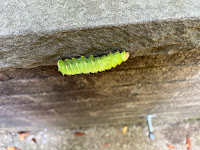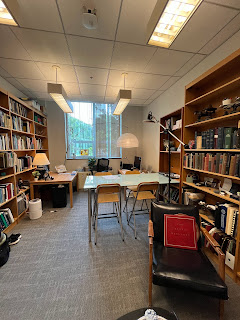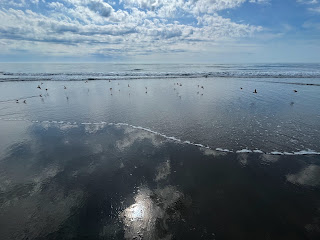The op-ed below appeared in the Philadelphia Inquirer last May after the shooting in Uvalde, Texas. There's been another shooting, so many other shootings. We throw up our hands and say there are too many guns but what's to be done? If we had the will, if we cared about the lives of our children and our young people, perhaps we could see to it that there were fewer guns. We may never stop all of the violence, but to say that we can stop none of it is untrue.
We have gun toting congresspeople, but I wish someone would ask Marjorie Green Taylor Greene or Lauren Boebert every time they speak, why do you need to carry a people-killing machine in your purse?
I wondered what image to put with this post, a photo of the original article, or some religious image, perhaps Christ bent under the weight of a cross. But part of me really thinks that what should go with these articles are pictures of the carnage. Detailed, up close, many, pictures of the carnage, the physical as well as the emotional. I spent time many years ago in Ignatian contemplation of the crucifixion, and wonder if we need a national contemplation of these tragedies in much the same way. Not to experience the horror of it, but to viscerally experience the weight our sins and know how we must change and live from that reality. To truly see what we have chosen as a nation. It surely isn't life.
Ted Cruz is “fervently lifting up in prayer the children and families.” Mitch McConnell is praying fervently, too. My Twitter feed is full of thoughts and prayers for Uvalde, Texas, where an 18-year-old gunman killed 19 children and two adults on Tuesday afternoon.
Prayer.
We keep using that word, but what do we mean?
As someone who writes regularly about prayer, every time I see “thoughts and prayers” in my Twitter feed or hear it uttered by a politician on the news, I wonder what we think we’re praying for.
Are we offering to make some vague noise in the direction of God’s ear and then move on? Or do we have something specific in mind that we expect God to come down and take care of? Perhaps a miracle that restores the lives lost, or some divine assurance that something this horrific will never happen again — or at least not to us.
C.S. Lewis once said, “I pray because I can’t help myself. I pray because I’m helpless … It doesn’t change God — it changes me.” Are we willing to pray fiercely — even desperately — to change the way we approach guns, as individuals and as a nation?
Remington claims its version of an AR-15 rifle will give you “the confidence and firepower to get the job done.” Are we willing to pray to change the conversation, to dispense with euphemisms and say aloud what the job of a gun is: “This AR-15 will allow you to kill or maim another human being. Many human beings. Quickly.”
In Buffalo, N.Y., 10 in two minutes.
Can we pray for the vision to see how guns change us? To grasp that we might secretly relish holding the power of life and death in our hands, to consider we sometimes buy guns because they make us feel a little like gods ourselves, or if not gods, at least like a superhero. Or a patriot.
Are we willing to pray that we can change — that we could imagine ways to reduce, if not eliminate the carnage, as other countries have done? Or perhaps should we be praying for forgiveness from the families of the next classroom full of terrified children who will die in a hail of bullets? And we won’t have long to wait. On average, one child is shot every hour of the day in America.
We say now is not the time, in the wake of a tragedy, to think about the solutions. Instead, we should focus on thoughts and prayers for the dead, the dying, and those who loved them. But what are the prayers for, if not to change things? We must go beyond issuing vague petitions in the wake of a tragedy. Instead, we can offer ongoing, concrete prayers for our own change of heart, and for the hard, realistic thinking and respectful dialogue it will take to change a nation.
Perhaps the next time our leaders are offering their thoughts and prayers in the wake of a mass shooting, they might take the lead and say what those prayers and thoughts are.
That would be a miracle worth praying for.


















